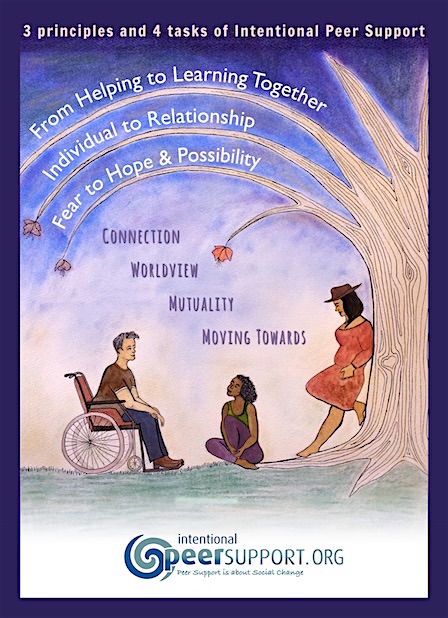“As peer support in mental health proliferates, we must be mindful of our intention: social change. It is not about developing more effective services, but rather about creating dialogues that have influence on all of our understandings, conversations, and relationships.” – Shery Mead, Founder of IPS
.
Intentional Peer Support is a way of thinking about and inviting transformative relationships. Practitioners learn to use relationships to see things from new angles, develop greater awareness of personal and relational patterns, and support and challenge each other in trying new things.
IPS is unique from traditional human services because:
- IPS relationships are viewed as partnerships that invite and inspire both parties to learn and grow, rather than as one person needing to ‘help’ another.
- IPS doesn’t start with the assumption of a problem. With IPS, each of us pays attention to how we have learned to make sense of our experiences, then uses the relationship to create new ways of seeing, thinking, and doing.
- IPS promotes a trauma-informed way of relating. Instead of asking “What’s wrong?” we learn to ask “What happened?”
- IPS examines our lives in the context of mutually accountable relationships and communities — looking beyond the mere notion of individual responsibility for change.
- IPS encourages us to increasingly live and move towards what we want instead of focusing on what we need to stop or avoid doing.
.
“Intentional Peer Support is about conversation. It’s about how we know, how we create new “knowing” through dialogue, and about how we as human beings interrelate by beginning to practice the art of connection – with ourselves, the people in our lives, and the people on the planet we may think we have nothing in common with. For me, it is a practice that has no right or wrong. It is always in flux; much like improvisation in music. It is a process of experimentation and co-creation. It assumes that we “play” off each other and create ever more interesting and complex ways of understanding. We see it as a tool for keeping the world on its toes, becoming more comfortable with less predictability as we become less reactive to fear. In other words, it is not another practice that presumes to have the answers but instead, it aims to generate good questions.” Read more, including the first chapter of IPS: An Alternative Approach, in our Articles Section.
At the end of the day, IPS is really about building stronger, healthier, interconnected communities. Learn about our Trainings.


